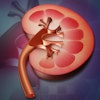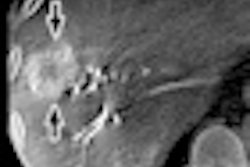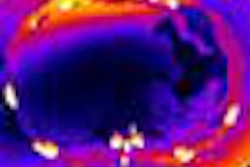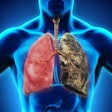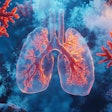Male smokers with low levels of serum bilirubin are at much greater risk for lung cancer and could be good targets for low-dose CT screening and other preventative measures, according to research presented at the 2013 American Association of Cancer Research (AACR) meeting.
The study team, led by Dr. Xifeng Wu, PhD, a professor and chair of the University of Texas MD Anderson Cancer Center Department of Epidemiology, analyzed 60 samples of metabolites in three groups of patients, or "trios": normal controls, early-stage, and late-stage non-small cell lung cancer patients.
The three highest-level metabolites were then validated in two more groups of 50 individuals and 123 trios. When bilirubin, a metabolite biomarker produced during the breakdown of old blood cells, was found to be the most significant metabolite, the study team performed another validation study in 208,233 men in Taiwan.
The men were divided into four groups based on bilirubin levels. Lower levels were associated with significantly higher rates of both lung cancer incidence and mortality. Incidence per 10,000 of the men was 7.02 in the quartile with the lowest bilirubin levels (≤ 0.68 mg/dL) versus 3.73 in the quartile with the highest levels (≥ 1.12 mg/dL).
Mortality followed a similar pattern with 4.84 deaths per 10,000 person years in the lowest-level quartile versus 2.46 years in the highest.
Low levels of bilirubin, an antioxidant with anti-inflammatory and antiproliferative effects, should be considered an urgent message to quit smoking, said co-lead author Dr. Chi Pang Wen, PhD, from National Health Research Institutes in Taiwan. The study was also supported by the National Cancer Institute and the MD Anderson Research trust.
The next step is to assess the predictive value of bilirubin in heavy smokers and to develop a risk prediction model that incorporates bilirubin and other biomarkers with clinical and epidemiological data to boost the efficacy of lung cancer risk prediction, Wu said.
The National Lung Cancer Screening Trial (NLST) found CT screening could reduce lung cancer mortality by at least 20%, but 98% of CT findings are benign, leading to efforts to find biomarkers to improve selection of screening candidates.


